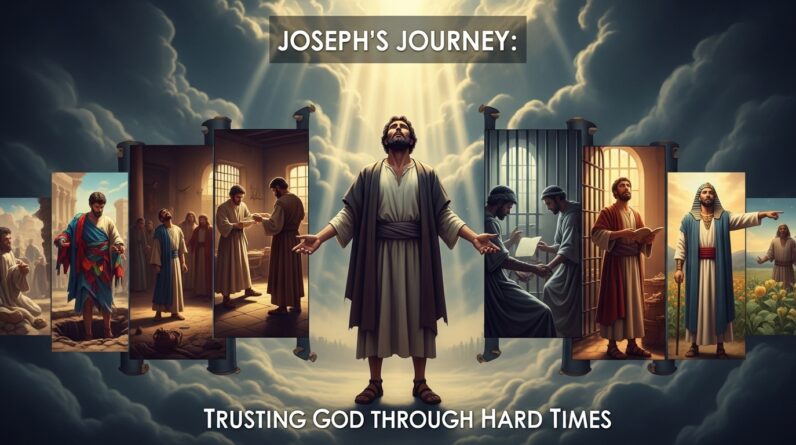Explore Job’s unwavering faith amidst suffering as he navigates loss, divine dialogue, and restoration, ultimately deepening his understanding of faith and God.
Job: Faith in Suffering – Job 1:20-22; Job 42:1-6

Introduction
In the heart of the Old Testament, nestled within its poetic wisdom literature, lies the poignant story of Job—a man whose narrative stands as a beacon of unwavering faith amidst unimaginable suffering. Job’s story is a testament to the resilience of the human spirit when tethered to divine trust, even under the harshest of life’s tribulations. His tale is not merely one of loss; it is a profound exploration of faith, integrity, and the human condition as it grapples with suffering beyond comprehension. Job becomes significant not just for his patience and endurance but for his raw, honest dialogues with God. Job teaches readers that questioning and suffering can coexist with a deep-seated faith.
Job’s Story in the Bible
Job’s narrative unfolds in the land of Uz, depicting him as a man of great wealth and virtue. Described as “blameless” and “upright,” Job was a man who feared God and shunned evil. His life was seemingly perfect, blessed with abundant livestock, numerous servants, and a large family. However, the real story begins not on Earth, but in a celestial assembly where God boasts of Job’s righteousness to Satan. The adversary challenges Job’s faithfulness, insisting it hinges solely on his prosperous circumstances. So begins God’s allowance of a series of devastating trials to prove Job’s unwavering loyalty.
Tragedy strikes Job swiftly and harshly: his livestock is stolen or killed, his servants are murdered, and his children perish in a catastrophic building collapse. Yet, in his grief, Job does not curse God. Instead, his faith shines through in his response, showing profound resignation and worship: “The Lord gave and the Lord has taken away; may the name of the Lord be praised” (Job 1:21). As if these losses were not enough, Satan afflicts Job with painful sores, pushing his physical endurance to its limits. Job’s friends arrive to provide solace, but their lengthy dialogues challenge rather than comfort, as they mistakenly equate Job’s suffering with personal sin.
Despite the profound anguish depicted in Job’s lamentations, he maintains his innocence, engaging in an intense theological debate about justice and divine order. Through chapters of protest and lament, Job demands an audience with God to understand the reason behind his undeserved suffering. Ultimately, God responds not with explanations, but with a series of questions exploring the mysteries of creation, humbling Job. Confronted with the divine presence, Job repents “in dust and ashes” (Job 42:6), acknowledging his previously narrow understanding.
God honors Job’s steadfast faith by restoring his fortunes, blessing him with twice as much wealth as before and another ten children. The story of Job, thus, concludes not just with restoration, but with deeper knowledge and understanding between the divine and human realms.
Lessons from Job’s Life
From Job’s story, we glean powerful lessons about the nature of faith, suffering, and human perseverance. Firstly, Job’s life exemplifies the endurance of faith amidst trials. Unlike a passive acceptance of fate, Job’s wrestling with suffering shows that true faith may involve grappling with complex emotions and expressing heartfelt lamentations. His story encourages believers that voicing doubts or confusion does not negate faith but can be part of a genuine relationship with God.
Secondly, Job’s interactions with his friends serve as a caution against assuming suffering is directly tied to personal wrongdoing. His story demonstrates that suffering is not always an indicator of divine displeasure but can be part of the mysterious workings of life and divine providence. Job’s refusal to admit to sins he didn’t commit exemplifies integrity and the importance of maintaining one’s truth amidst external pressure to conform to misguided perceptions.
Finally, through Job’s story, we learn about humility before divine wisdom. In the end, Job’s repentance isn’t out of guilt for hidden sins but from recognizing the limits of his understanding. His journey teaches that trust in God goes beyond demanding answers; it involves acknowledging our limitations and embracing the magnificence and mystery of the divine order.
Connection to Today’s World
Job’s narrative speaks powerfully to contemporary audiences facing trials, uncertainty, or hardship. In a world rife with challenges—from personal loss to global crises—Job’s faith amid suffering resonates deeply. It reminds us that maintaining faith does not exclude feelings of despair or questioning. His experience challenges and encourages individuals to remain honest in their faith journey, allowing room for doubt as a part of a mature relationship with God.
Furthermore, Job’s story underscores the importance of empathy and humility when approaching others in distress. Just like Job’s friends, we are often quick to judge or provide simplistic solutions to complex problems. Job’s narrative pushes us to offer presence rather than presumption, listening ears rather than explanations to those who suffer around us.
Job’s ultimate restoration serves as a beacon of hope, reminding us that while suffering may feel eternal, it does not have the final word. There is a promise of renewal and restoration—whether metaphorically or literally. Job’s tale assures us that resilience, accompanied by faith, can bring healing and wholeness back to life’s broken narratives.

Key Bible Verse
One key verse that encapsulates Job’s journey is Job 42:5: “My ears had heard of you but now my eyes have seen you.” This verse marks a pivotal moment in Job’s story, reflecting his transition from second-hand knowledge of God to a profound, personal encounter. It conveys a journey from superficial understanding to deep experiential spiritual insight, encouraging readers to pursue genuine encounters with God beyond mere intellectual acceptance.
Thought-Provoking Question
Reflecting on Job’s journey, consider this: In your own life, when faced with trials and suffering, are you open to seeing God beyond preconceived beliefs, allowing for growth and deeper understanding through those experiences?







